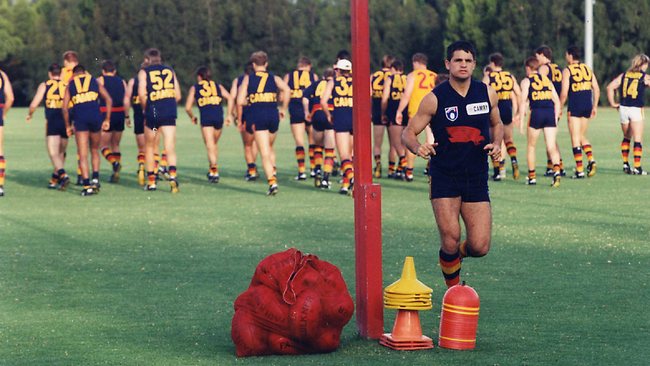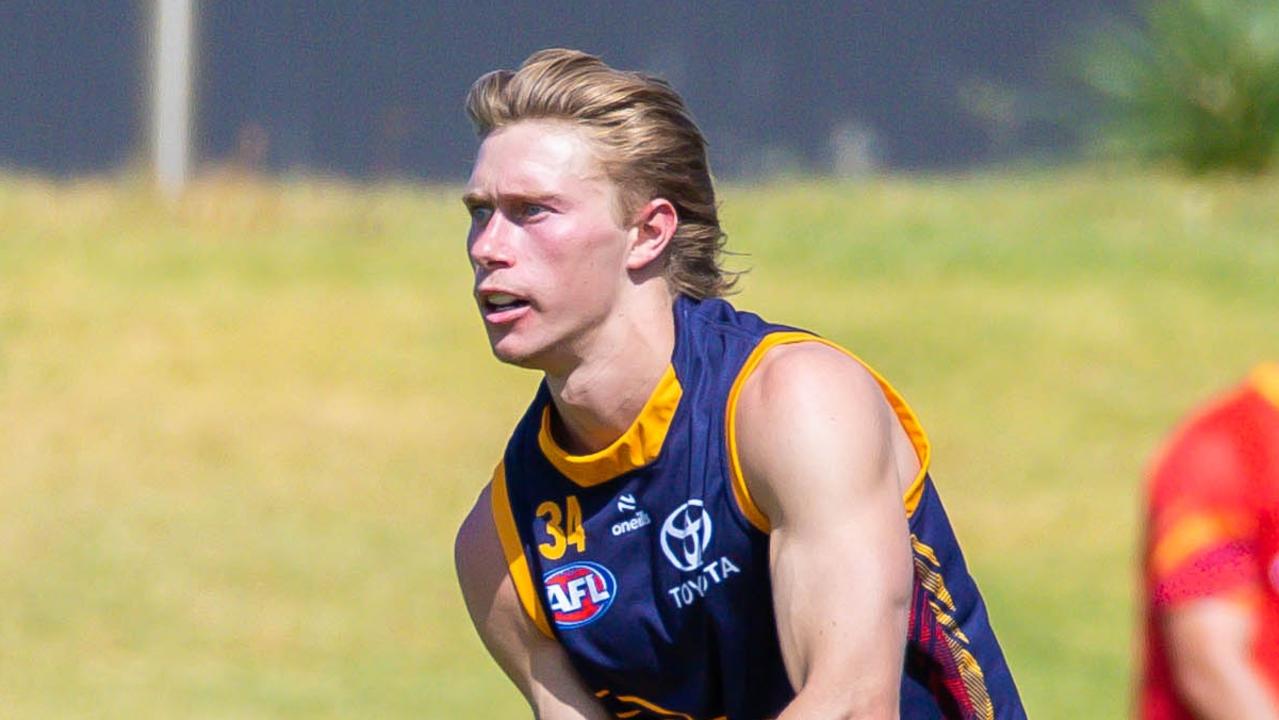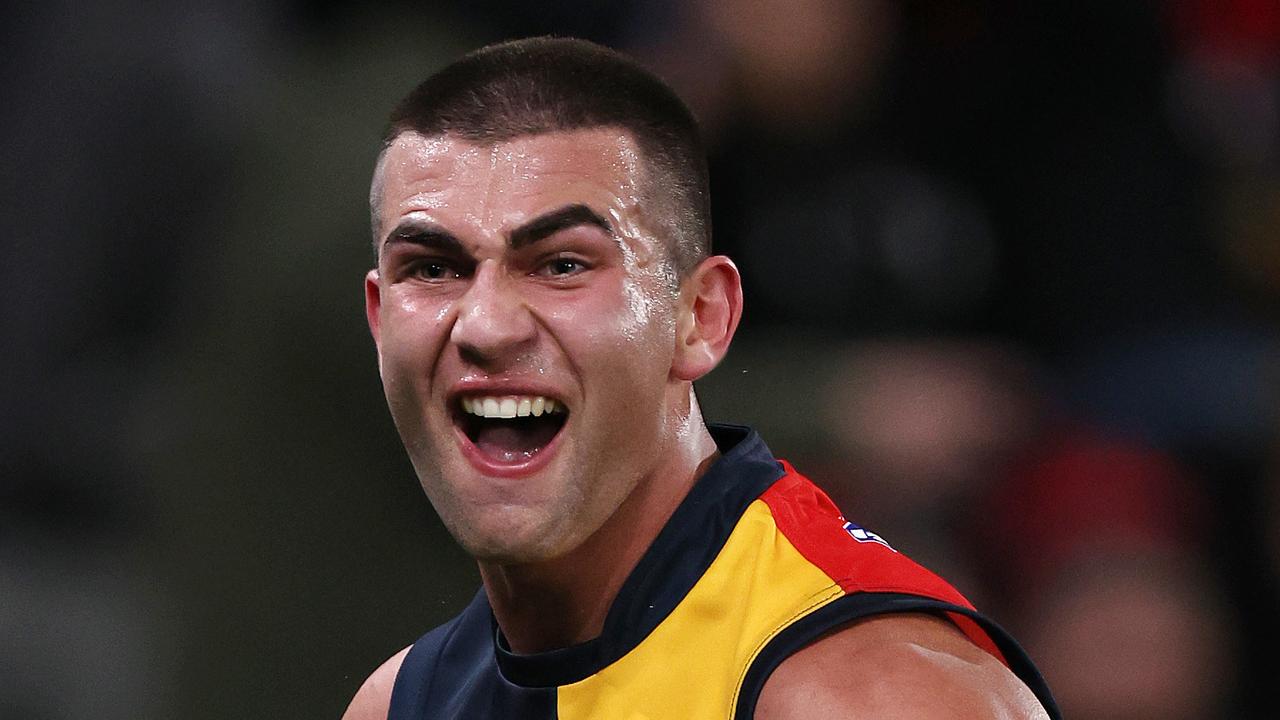The ghosts of '93 still haunt the old Adelaide Crows
IT'S 20 years since the Crows shocked football with an audacious finals run in their third season. Jai Bednall speaks to the key figures.
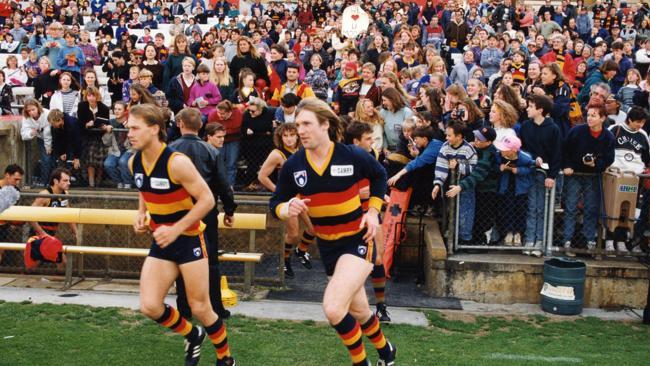
Crows
Don't miss out on the headlines from Crows. Followed categories will be added to My News.
"1993 was our opportunity to win a flag and we blew it. That's the bottom line. Three years in the competition and we could have won a Grand Final. It's unheard of. None of us watched the Grand Final, it was too hard. We would have beaten Carlton - and they knew that. Carlton knew that." - Andrew Jarman
THE memories are just as painful two decades later.
Leading by 42 points at half-time of the 1993 preliminary final, a young Adelaide side did the unthinkable and lost to Essendon.
Countless moments from the second half have become etched in AFL folklore - Andrew Jarman's missed set shot, Gavin Wanganeen's tackle of David Brown and Tim Watson's game-sealing goal.
But there were many other heroes - and culprits - in the lead-up to those final moments.
Adelaide, with 129 goal heart-throb Tony Modra leading the way, had been one of the stories of the 1993 season.
Old heads Chris McDermott, Tony McGuinness, Andrew Jarman, Greg Anderson and Scott Lee had been joined by a host of talented youngsters including Mark Ricciuto, Ben Hart, Shaun Rehn, Nigel Smart and Simon Tregenza to form a formidable line-up.
Backed by a football-mad SA public the Crows achieved a shock win against Hawthorn at the MCG in the elimination final to give themselves two attempts at making a Grand Final.
But disappointing defeats against Carlton and the Bombers saw the Crows fall agonisingly short of a maiden premiership.
"The biggest mistake I made in 1993 was at the start of the season not daring to dream we could win a Grand Final," coach Graham Cornes said.
"Our focus was to make the top six and we had a strategy and that all fell in to plan.
"After the Carlton game I was really disappointed because we had our chance to go straight in to a Grand Final.
"But we hadn't thought of Grand Finals. Our main focus was to make the six; we didn't dream we could win a Grand Final in our third year. That was the biggest mistake we made all year, not planning for that."
The Advertiser watched Adelaide's final minor round game against Collingwood and its three finals, read through newspaper archives and Graham Cornes' pre and post-match notes and interviewed almost 20 of the participants and witnesses. These are their stories.
Win and we're in
The 1993 season saw one of the most closely contested minor rounds in AFL history. Essendon topped the ladder with 13 wins and a draw from 20 games - just three and a half games clear of 12th placed St Kilda. Adelaide enjoyed a strong season but missed an opportunity to lock up a finals berth in the penultimate round, falling to Hawthorn by 27 points at Waverley. It left the Crows needing a win against Collingwood at Football Park in the final game of round 22. Geelong would take their place in the top six if they lost.
GRAHAM CORNES (coach, Adelaide): In year three there was no alternative but to make the finals. We'd won 10 games (in 1991) and 11 games (in 1992) and hadn't made the finals. We knew we could beat anyone at home, because we had beaten everyone at home. And we knew we'd win a couple away. It was always going to come down to that final game against Collingwood.
ALAN RICHARDSON (wingman, Collingwood): It was a dead rubber for us. Our motivation from a team perspective was to stop Adelaide from getting in the finals.
Cornes made three changes to his line-up for the Magpies game, calling up young defender Mark Viska and key forwards Randall Bone and Sean Tasker. Ben Hart (hamstring) and Rodney Maynard (shoulder) couldn't be considered and Stephen Rowe was dropped.
STEPHEN ROWE (forward pocket, Adelaide): I played 13 or 14 games and I thought I'd cemented a spot but with only two on the bench and with two good crumbers in Matty Liptak and David Brown, I was probably third or fourth in line. I knew that. Norwood was making a run to the finals as well. It was bittersweet because if I missed out with the Crows I always knew that Norwood was there.
GRAHAM CORNES: Rowey was a great team man, he never spat the dummy and always gave us his best when he came in. But he was always our third rover back then.
Magpies coach Leigh Matthews pulled a surprise by starting Saverio Rocca in ruck at the opening bounce. The tactic worked as the Magpies - with Rocca kicking three first term goals - jumped out to an early lead.
SHAUN REHN (ruck, Crows): Sav got hold of me early. He thumped the ball to centre half forward a couple of times and really got them on a bit of a roll.
ALAN RICHARDSON: We didn't do it often because Sav didn't have a big motor. He was a real power athlete. When he did go in the ruck for short bursts he always had an impact because of his leap. That was clearly a strategy against big Rehny.
ANDREW JARMAN (centre, Adelaide): They were on fire. At quarter-time Graham kept things calm and was very positive. We just weren't winning the centre square so he made a couple of subtle changes. We just had to get the ball in quick to Mods. I remember that was the message - get the ball in quicker because we were messing around with it.
Modra ignited in the second term, seeing off his initial opponent Gavin Brown, who was replaced by Gary Pert. Matthew Liptak was also outstanding, racking up 18 disposals and two goals before half-time as the Crows added 7.6 to 2.4 in the second term to grab a one-goal lead.
MATTHEW LIPTAK (forward pocket, Adelaide): I was still trying to secure a spot before the finals. I was lucky enough to get a game against Collingwood and then play for my life really. I was at a bit of a crossroads in terms of choosing footy or getting back into my (medical) studies. I was almost going to call my football career that year. I remember we played pretty well as a team that day.
GRAHAM CORNES: It didn't start off that well for us that game, we were struggling early. Then Tony Modra took that mark over Gary Pert - kicked the goal - and then bang, bang, bang.
MARK BICKLEY (midfielder, Adelaide): That Modra mark got the crowd involved and we played pretty well after that.
SEAN TASKER (forward, Adelaide): Tony looked like he hurt himself during the third quarter and they were worried about him. I remember running up and down the sidelines about four or five times thinking I was going to get on but Mods was fine so I sat back down.
With Adelaide up by five goals in the third quarter and looking home Collingwood skipper Tony Shaw made an unusual attempt to unsettle the opposition, planting a kiss on Jarman's cheek after a centre square scuffle.
ANDREW JARMAN: Shawy and I had a bit of history; we were always trying to unsettle each other. We were similar type players - we didn't have the most explosive leg speed and we played inside. He loved the chat and I obviously loved to have a bit of a chat. Our chats were about our mothers, our grandmothers, our sisters … I won't elaborate. He thought he'd rattle me by giving me a kiss on the cheek. What he was trying to do was get me reported. He said 'you're going to get three weeks for this'. In our days you could get away with a lot of stuff you can't get away with today. I tried to squirrel grip him a couple of times but I missed him.
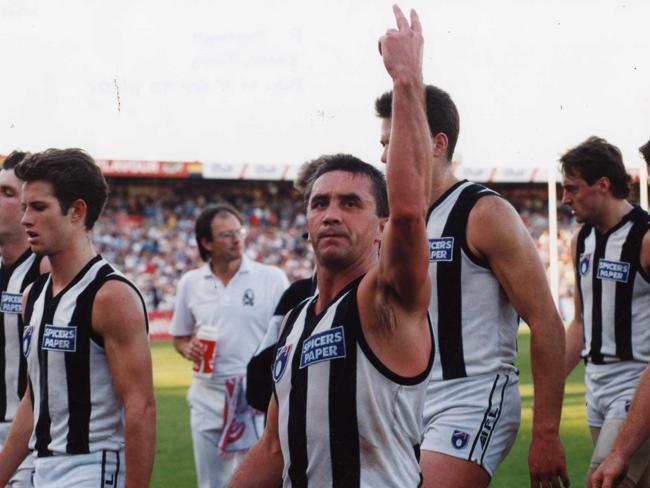
Shaw's efforts were in vain as the Crows - led by an outstanding second half performance from Tony McGuinness - cruised to a 24-point win. Modra finished with five goals and McGuinness polled three Brownlow votes.
ANDREW JARMAN: I remember the crowd got us home that day. The noise in the last quarter was the loudest I've ever heard. I'll never forget that.
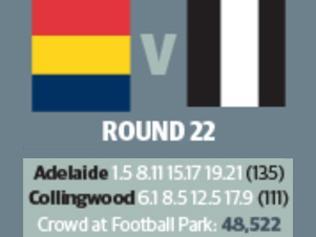
SHAUN REHN: The crowd started chanting 'We're in the finals'. It was a pretty satisfying game. For blokes like McGuinness, McDermott, Jarman - those older blokes who were trying to make hay while the sun was shining - it meant a helluva lot.
GRAHAM CORNES: It was pretty exciting. It was our third year and we'd made the finals and were going to play Hawthorn at the MCG. But I think everyone kept their mind on the job.
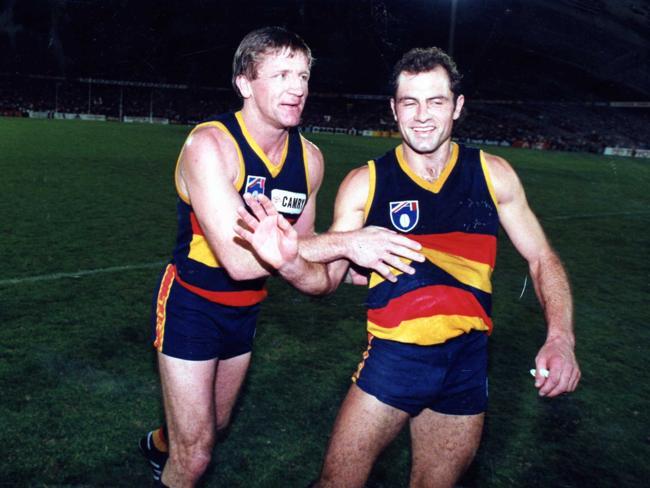
Finals fever
Adelaide was given little chance - at least across the border - of defeating a Hawthorn outfit which had qualified for its 12th consecutive finals series. The Hawks had 154 games of finals experience in their side. Adelaide had just seven - all played by Greg Anderson during his five years at Essendon. Still, the Crows were confident.
GRAHAM CORNES: They held no fears for us. We'd beaten them at Waverley before, we'd beaten them at Footy Park and we'd been competitive in a game two weeks prior. They were a team probably on the decline and we were just coming in to the best football we've ever played.
ANDREW JARMAN: A lot of us had watched what Hawthorn did through the 1980s. The 1989 Grand Final was for me, the best game I've ever watched. We knew we were up against a side that just loved playing at the MCG. But there was more pressure on them. We felt there was more pressure on them. We got a lot of confidence out of the Collingwood win.
ANDREW COLLINS (midfielder, Hawthorn): The 1993 season was what we thought was going to be our last real chance. It was Alan Joyce's last year as coach and many of our legends had left. Tucky had left, Dipper had left, it was Gary Ayres' last year, Dermie left for Sydney the following year … and we had a lot of injuries. We thought 1993 would be our last time together. The Crows were an emerging young side.
First there were battles to be fought off field. Adelaide preferred wearing blue rather than white shorts and insisted on using Faulkner footballs instead of Sherrins. It won the right to wear its favoured shorts and amazingly struck a deal to alternate between footballs each quarter.
BILL SANDERS (general manager, Crows): We felt the blue gave us a more physical and robust appearance. There weren't away strips then. The blue shorts were part of our uniform and we wanted to wear them.
GRAHAM CORNES: Using Faulkners was one of my grand theories, because everyone hated Faulkners. But Faulkners had been really good to us in the early days of the Crows. When we started - at our first training - we didn't have any balls. They used to provide them. I always felt indebted to them so even though everyone hated them, we used the Faulkners. My theory was if we used the Faulkners and it wasn't a big deal to us, every time the opposition had to play with Faulkners it would have some sort of impact.
Hawthorn's team was on average a full two years older than the unchanged Crows line-up. But the Hawks still had numerous weapons, including 123 goal full forward Jason Dunstall, an 18 year old Shane Crawford and Brownlow Medallist John Platten. But it was Croweater Darren Jarman who was singled out for special attention at the opening bounce.
ANDREW JARMAN: Weed mentioned to me before the game 'I'm going to rattle your brother a bit'. I said 'Do whatever you have to do - within the rules or outside the rules, I don't care, as long as you put him on his backside'. And he did. And that rattled my brother, he didn't like that.
GRAHAM CORNES: We wanted to have a strong physical presence, particularly against Hawthorn because that was their style.
Adelaide settled quickly with wingmen Anderson and Simon Tregenza leading the way. But the Hawks levelled the score at 3.4 a piece by quarter-time as Tony Hall fired early on 18 year old Mark Ricciuto.
MARK RICCIUTO (back pocket, Adelaide): Tony Hall was at that point the hardest working player I'd ever played on. He was a mobile centre half forward and a gun player. I remember chasing him and thinking 'this bloke can run'. He kicked three goals on me but I played OK too.
SHAUN REHN: We were just in the game straight away. We hit the ground running and played some really good football.
MARK BICKLEY: We probably weren't aware of the excitement it was generating. We thought a few people might travel across to Melbourne but once we started playing well it felt like there was 25,000 South Australians there. It was enormous.
The Crows broke the game open in the second term kicking seven goals to three. Liptak finished the half with 14 disposals and two goals and Andrew Jarman cleaned up Collins - ending his day and freeing McGuinness of a tag. The Crows - who averaged 40 more handballs per game than any other side that season - set up most of their attack with quick hands.
GRAHAM CORNES: The biggest advantage South Australians had coming into the AFL was our quick hands. We'd worked on quick hands ever since Tony Hall injured his knee. He'd come to training and he'd get five or six guys to just throw the ball at him. He worked on his quick handball to the point where when he was due to come back I rang the umpire's coach and said 'his hands are that quick that your guys will call him for throwing but he's not throwing, just look at his hands'. From that moment on we employed those Tony Hall drills in all our training at Glenelg and then brought it into the Crows. It was the one advantage we had that we tried to capitalise on.
The Hawks were too proud to lie down and on the back of an outstanding third quarter by Crawford began to bridge the gap. Chris Langford was winning his battle with Modra and Dunstall's fifth on the three quarter time siren cut the margin to seven points.
ROD JAMESON (full-back, Adelaide): I stood Dunstall and Rocca and Lockett and Ablett and Kernahan and all those guys from that time on. Out of all them he was one of the more difficult to play on because of his size. He fell on me in a pack just before half-time and I ended up having a local in my ribs because he busted two of my ribs. I missed the Carlton game and the Essendon game for that reason.
The Hawks continued to dominate early in the fourth and grabbed a four-point lead after goals from Paul Hudson and Dunstall. But they missed their next four shots at goal and a chance to bury the game.
MARK BICKLEY: The game ebbed and flowed, it was a bit of a see-sawing battle. They had a great side still and had some of their stars still playing.
GRAHAM CORNES: I thought we really had them. Gary Ayres ended up playing centre half forward and there was a hint of panic about them. Matty Liptak kicked a goal in the last quarter from about 65m out and it was just easy then.
MATTHEW LIPTAK: I'm sure it was from the half back flank (laughs). I think I took it off Jars on the wing and had an open goal square to kick for and it went through. It was great.
Nigel Smart and Stuart Wigney provided the finishing touches on a 15-point win. The Crows had shocked the football world.
SEAN TASKER: I had never played on the MCG before that final, it was a dream come true. I actually stole a chunk of the MCG turf. I ripped up a handful at the end of the game and shoved it in my footy bag. I planted it at home in Medindie so whoever lives there now can honestly say their backyard is MCG turf.
SHAUN REHN: It was a bloody good day for the club that one. No one had picked us. No one expected us to win.
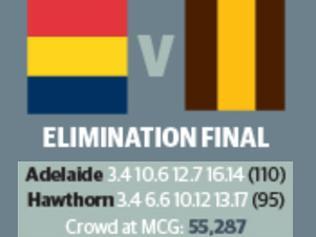
ANDREW JARMAN: When the siren went we couldn't believe it. We were ecstatic. When we arrived back at the airport after that Hawthorn game it was like we were the Beatles. We had people chasing us to our cars, it was scary.
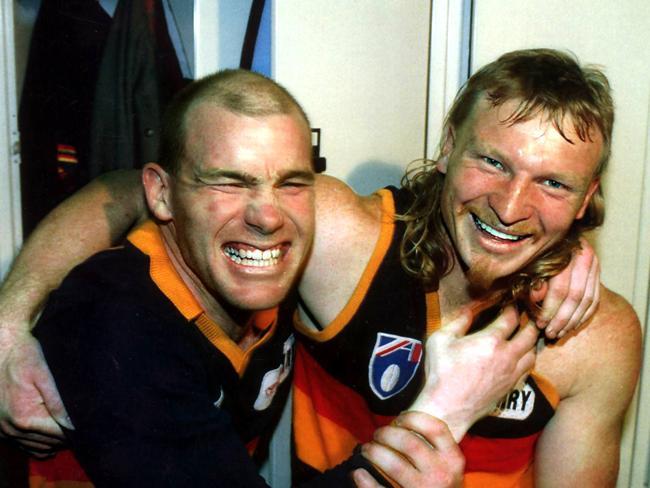
MARK RICCIUTO: I remember the cop coming on to the plane and saying 'guys, we need your help, we fear for people's lives'. There were 5000 people crammed in to the old terminal. It was just about impossible to get our bags off the belt. The next week we got dropped off at a different hanger. It was absolutely crazy stuff. We were like rockstars and Mods at the time - as Cornesy has said - was bigger than Bradman.
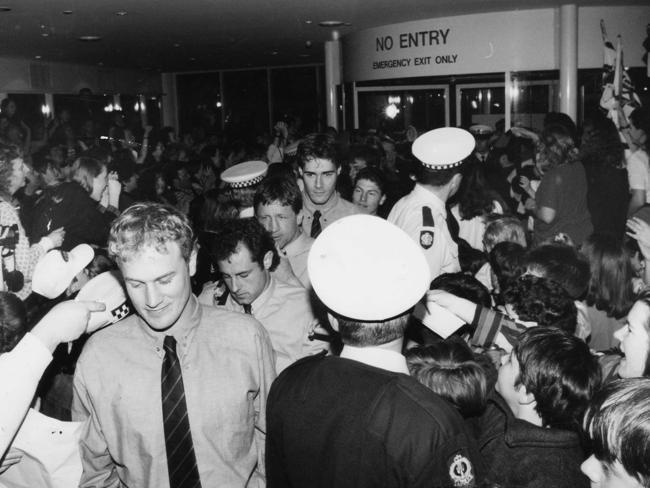
ANDREW JARMAN: Mods would have 40 to 50 girls waiting for him outside after training. He'd have to dress up and sneak out and we'd have to take his car out for him because he'd never get home. It was unbelievable. He was just massive.
BILL SANDERS: Modra was the reason we started employing security at away games - to get him from the changerooms on to the bus. There were just masses of people wanting to get a piece of Tony Modra.
TONY MODRA (full forward, Adelaide): I didn't really take much notice. I thought that was all part and parcel of AFL football at the time. I was just happy to play and tried to get on with life as best as possible outside of football. It wasn't until the end of the year I realised what had just happened.
A unique opportunity
Upset wins by Carlton (against Essendon) and West Coast (against North Melbourne) meant Adelaide progressed directly to a second semi against the Blues. Cornes replaced the injured Jameson with Rodney Maynard. The Blues had moved in to outright favouritism for the flag.
CRAIG BRADLEY (midfielder, Carlton): We hadn't played in a Grand Final since 1987. Playing in Melbourne was a big advantage, particularly at Waverley. But the Crows had a really good team.
ANDREW JARMAN: After the Hawthorn win we actually felt we were a chance to win a flag. We felt we were a massive chance.
The Crows had all the play early, preventing the Blues from going inside 50 until the 10 minute mark of the opening term. But in a sign of things to come they couldn't convert their dominance, scoring only two goals through Stuart Wigney to lead by seven points at quarter time.
MARK BICKLEY: We kicked ridiculously bad at goals. We kept having shots from a long way out and they kept landing two or three metres short and they were just punching them through.
GRAHAM CORNES: We were in it, I mean we were really in it.
The Blues enjoyed the better of the second term, adding 3.4 to 0.5 to take a 10 point lead. The highlight was a running goal by Carlton ruckman Justin Madden.
CRAIG BRADLEY: You know you're going to win when Justin Madden is taking bounces and kicking goals. You think it might be your day.
SHAUN REHN: I remember Cornesy telling me pre-game 'just don't let him get goal side of you'. I crept up past him in the centre of the ground and they won an unlikely ball and the ball flicked straight out to him. I was 5m behind him and I just couldn't make up the difference. I get reminded of it all the time. It actually made a cameo in our team meeting (at Port Adelaide where he's an assistant coach) the other day. They showed a bit of footage of a giraffe running.
Modra kicked his only two goals of the game in the third quarter but misses by Tasker, Brown, Weidemann, Wigney, Pittman and Smart saw the Crows add 3.7 for the quarter. The Blues kicked 4.0, including three to Bradley.
GRAHAM CORNES: Craig Bradley just snuck away. He was on Mark Bickley - our most reliable player. But Bickley had one fault and that was when he saw the ball, he went for the ball and Craig Bradley would hang out and wait for the ball to get knocked out and away he'd go. He was smart. I'd never be critical of Mark Bickley because he was great. But he was probably the wrong run-with player for a player like Craig Bradley.
The Crows kept fighting but couldn't find a way through the Blues defence. Mil Hanna blanketed Smart, Ang Christou and Michael Sexton continually ran off Wigney and Randall Bone and Modra was well held by Stephen Silvagni.
ROD JAMESON: They had a pretty awesome backline.
SEAN TASKER: Silvagni was everywhere, he was like the Octopus Man. Everytime you'd kicked the ball and thought it was going through he'd bob up and get a hand on it.
CRAIG BRADLEY: When you've got Stephen Silvagni in your backline, you're always going to be OK.
GRAHAM CORNES: Very rarely does the key forward dominate in finals. You've got odd occasions, like Ablett in the 1989 Grand Final but you cannot rely on your key forwards to dominate in finals - it's a totally different game.
TONY MODRA: We had some good tussles. We seemed to take it in turns of who was playing well. It was his turn that day but I remember the following year we played Carlton in round one and I kicked 13. I still hadn't forgot about that final.
The Blues ended up winning 13.8 (86) to 8.20 (68). There was no questioning Adelaide had kicked itself out of a Grand Final.
ANDREW JARMAN: The Carlton game really hurt us. If we won that we were in a Grand Final. We were the best side on the day, we just didn't finish off. We didn't play smart footy. We didn't take our chances so we didn't deserve to win.
SHAUN REHN: I don't think we quite understood the opportunity that was in front of us in that game. I was up against it playing on Justin Madden. I was just a kid and he was a lot bigger and stronger. I remember thinking within myself that I just couldn't influence the game. He actually had me.
MARK RICCIUTO: We should have won that game. We dominated but Craig Bradley was the difference in the end.
CRAIG BRADLEY: I remember being so relieved after the game that we were in a Grand Final again.
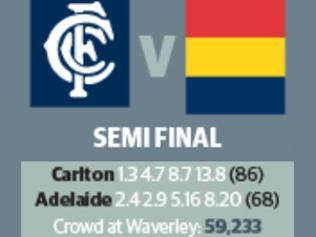
One last chance
The Crows returned home in reasonable spirits knowing they had another opportunity to make the Grand Final against Essendon the next week. But in Cornes' opinion, some players were a bit too relaxed.
GRAHAM CORNES: We'd been on the road three weeks out of four and we'd played on Waverley. Kevin Sheedy had made the comment the week before teams playing on Waverley take a lot longer to come up after a game. I was really concerned about that. So on the way home I said 'look we need to be ready and recovered and recuperated and rehydrated for the following week'. We called training for the Sunday morning and the condition some of the guys turned up in was just so disappointing. Then we got reports during the week certain players had been seen at nightclubs in the early hours of the morning. One of them didn't make it to training and another went straight from the nightclub to training and slept in his car. I didn't say anything then … It was always hard for me because being a teetotaller, guys always saw me as a bit of a wowser.
Cornes faced a defining moment at selection that week. Ben Hart was ready to return from his hamstring injury and Scott Hodges had kicked nine goals for Port Adelaide in the SANFL to press his claims. Jameson and Rowe were also putting their hands up.
ROD JAMESON (full-back, Crows): I had the one week off against Carlton and I thought at the time Graham was just looking after me. Before the Essendon game I had to go and see Dr Brian Sando because I couldn't run or breathe and so he jabbed me up at training. I got through training but I remember Graham found out I'd had a local in my ribs and he highlighted that on the track and that's why he didn't pick me against Essendon - even though I could have played. I was livid. I was prepared to play and could have played.
Rowe dropped by Norwood for missing warm-up
TREVOR JAQUES (fitness co-ordinator, Crows): That was the sort of thing Graham was hot on - he needed to know. If players didn't tell him then he'd come down on them.
GRAHAM CORNES: If he had to have a jab to train I couldn't pick him. That's based on the fact I played in a Grand Final in 1974 with jabs in the ribs. The jab wears off after a quarter and a half and you are restricted. He paid the price of the experience I had with that. I was always going to take fit players.
In the end Hart and Hodges came in for Bone and Tasker. Across the border, Bombers coach Kevin Sheedy was doing everything in his power to gain an edge.
MAX STEVENS (boundary rider, Channel 7): I've never spoken about this but it's 20 years on, so I guess it's OK now. Kevin Sheedy rang me about a week before the game asking if I could make up a videotape of all the Crows media appearances during the week. Back in those days the Adelaide Crows were a pretty big deal. Adelaide tried to keep a lid on things but it was very hard in this state. I used to make up tapes for Graham Cornes of hard hits and things like that he would use to motivate the Crows players. But I went to Essendon Grammar, John Birt was a teacher at my school and I had an allegiance to Essendon. I remember going to training at Windy Hill and giving the tape to Danny Corcoran.
Essendon was coming off a 32 point win against West Coast. Known as the baby Bombers because of the eight players (Gavin Wanganeen, Dustin Fletcher, James Hird, Joe Misiti, Mark Mercuri, Ricky Olarenshaw, David Calthorpe and Paul Hills) aged 20 or under in their side, Essendon entered the game as a $1.25 favourite.
GRAHAM CORNES: Robert Walls had written a piece in The Age on the Friday and didn't give us any chance, Essendon was going to thump us. I put that on the back of the player's handout and said 'Is that how you want it to be? Is that really how you want it to be? To just come to Melbourne to make up the numbers and go home with your tail between your legs?'
GAVIN WANGENEEN (back pocket, Essendon): We went into that game quite confident. Carlton had only beaten us by under a kick in the first final so we knew if we could get into the Grand Final we'd give it a good shake. We were still wary of Adelaide. They had a star-studded side.
The Crows got off to an ideal start, goaling through Liptak with just 40 seconds on the clock.
MATTHEW LIPTAK: The national anthem was still ringing in my ears. It was electrifying. Getting that first goal was a bit of a highlight goal for me over my career.
GAVIN WANGANEEN: I was on Liptak and he started really well. He was a dangerous small forward. You couldn't really give him any room. He was an elite runner and a forward you had to keep an eye on. You couldn't play too attacking because he could get you going the other way.
ANDREW JARMAN: What we focused on was just getting a fast start. They were playing on their home deck. It was 26C, it was hot. The ground was hard. We thought 'we beat Hawthorn, we almost beat Carlton, we're not afraid of these top sides'.
GAVIN WANGANEEN: They jumped us. They played some really good football. They moved the ball around with handball, broke the lines and played a really good brand of footy. They caught us off-guard.
Up 7.4 to 4.5 at quarter time, the Crows continued on their merry way in the second quarter. Modra had five goals to his name and was finding all sorts of space on Dustin Fletcher and Rehn brought the house down with a hanger over Hodges.
SHAUN REHN: It was the kind of moment I actually used to dream about as a kid. Weed put it up high and I remember hearing Scotty Hodges let out a big 'oof' as I climbed up his back. It was the one and only time I felt like I took a hanger in my whole life.
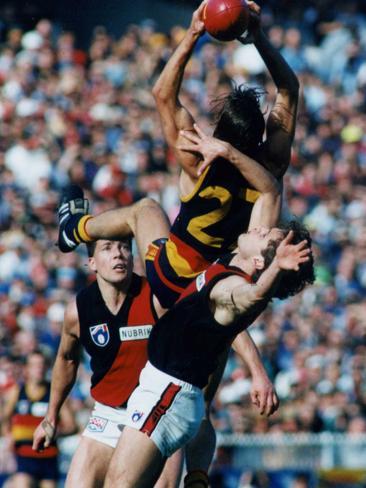
ANDREW JARMAN: We were all over them. That was the best football we played since the start of the Crows.
GRAHAM CORNES: We were so dominant in that first half and then Shaun Rehn missed a goal which might have made it an eight goal lead.
SHAUN REHN: I missed a couple of shots late in the second quarter and there were a couple of other opportunities. We could have actually gone in further in front.
Cornes also raised a few eyebrows by dragging Scott Hodges and replacing him with Wigney just before half-time.
TONY MODRA: In the first half I was going OK. We had a double-pronged attack down there with Scott Hodges but Scotty came off for some reason and as soon as he came off they double teamed me. It turned in Essendon's favour and it all fell apart from there.
ROD JAMESON: I think a few players questioned what the rationale was for taking him off. Maybe he didn't have a big impact but he had to get a good key defender.
GRAHAM CORNES: Hodges had kicked a goal but he only had one kick in the first half. He ended up coming back on in the third quarter anyway.
Still, the Crows had exceeded their wildest dreams in the first half. Leading 12.12 to 6.6 they entered the main break with one foot in the Grand Final.
MAX STEVENS: At half-time the Crows fans were going absolutely bunta because they thought the game was in the bag.
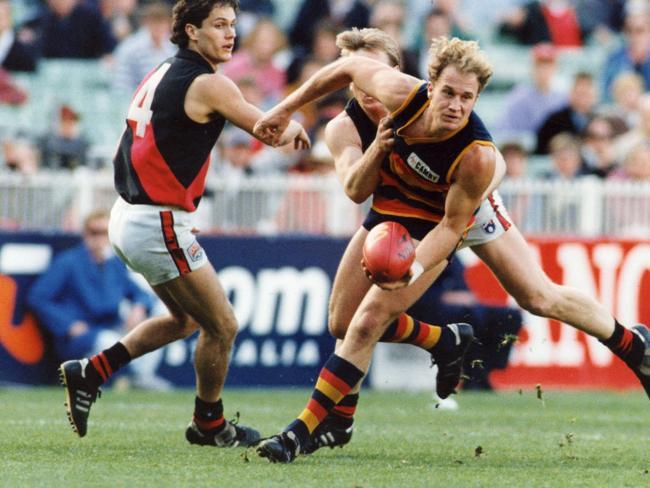
SHAUN REHN: We were up by seven goals in a preliminary final - a place we never thought we'd be. At half-time I just thought we weren't as calm as we could have been. There was a lot of movement, a lot of high voice, that sort of stuff.
Cornes thought carefully about how to approach the break. He'd been in a similar position in a game as Glenelg coach and had learnt a valuable lesson about self-fulfilling prophecies.
GRAHAM CORNES: At Glenelg this particular day we were five or six goals in front and I've come in at half-time and said 'Don't you be satisfied with that. Don't think for one minute this game is over. They're going to come back at you, make no mistake about that, you've got to be on your guard.' They came back at us, but we won. After the game our team psychologist Scott Way came up to me and said: 'You know what happened then, don't you? At half-time you planted a self-fulfilling prophecy in their brain, that they were going to come back and they did come back'. That always stayed with me. So at half-time of the Essendon game I can see Scott Way's face saying no self-fulfilling prophecies. You're in front because you've played well and it's just a matter of keeping on doing things you're doing.
In the end Cornes' message never really got home. As he huddled the players together for his final address there was a rude interruption.
MARK BICKLEY: This has become footy folklore. I play it up a little bit. Greg Anderson was working for Musashi at the time and he had us on all these powders and mixtures which did play havoc with everyone's gas. Just before we went out after half-time Cornesy pulled us into this tight pack and someone let one go. I don't think it was me to be quite honest. But I haven't denied it because I can't remember. Someone farted while he was trying to be serious and deliver this great speech and everyone was holding their nose. When you get in that tight huddle it's not a great place to drop one - it's worse than an elevator.
MATTHEW LIPTAK: It was the most ill-timed release of gas. Cornesy was in the most serious mode, trying to get us up for the second half and we're all in the huddle. Musashi was the choice of supplement in those days and that was rumbling in Bicks' stomach for a while. He just let out this stink bomb and not only did it sound like his stomach was falling out but the smell that reached out just changed the demeanour of the half-time break. I don't know if that was the thing that bombed us but it changed the mood in there that's for sure.
SHAUN REHN: If you look back it was quite funny because Graham found it quite difficult to make his last speech when the smell was so rancid. It basically emptied out the main area.
Over in the Essendon rooms Sheedy was working the Essendon players into a fervour.
GAVIN WANGANEEN: Sheeds spilled his heart out to us at half-time. He was talking about how our families, our wives, our parents are all in the stands watching. Go out there and play for them. That was part of it. It was very motivating and emotional. He just got us going.
KEVIN SHEEDY (coach, Essendon): It was important we didn't keel over. You can fight back to a respectable score by three quarter time and then anything can happen. There's a lot of horses who lead in the Melbourne Cup to the bend and then they come into the straight and all of a sudden they've got to find something. Luckily for us we found something.
MARK BICKLEY: They came out in the third and got a goal or two and started to get a bit closer and then Andrew Jarman got a free kick at the top of the goal square and missed - which was amazing because Jars was probably the best kick in the side. It would have been a nice steadier.
ANDREW JARMAN: That haunts me. I don't have too many bad memories of my football career but that one will sit with me. It was a 15-20m kick. If I kicked that it would have changed the momentum back to us again. I bloody blew it. I had Mark Thompson ripping in to me after that kick. I can hear his voice now just giving it to me: 'You've cost them the game, you've cost them the game, we're going to win it'.
KEVIN SHEEDY: It would have been very difficult if Jarman had kicked that goal.
GAVIN WANGANEEN: We got that first goal and then Darren Bewick got on the end of a couple. That was the spark. We started running the ball out of defence and taking the game on. A few things went our way.
Cornes reacted by sending Bickley to Michael Long and took David Brown off to play Scott Lee loose in defence. But the Bombers kicked 6.2 to 1.2 to reduce the margin to 12 points at three quarter time.
MARK BICKLEY: We made some really fundamental errors. There's a certain point where you get far enough in front that teams don't believe they can win it.
MARK RICCIUTO: I was standing Bewick and he kicked a few goals on me but it was one of those momentum changes where you couldn't do anything about it.
The Bombers continued to press early in the third. Bewick kicked his fifth and sixth goals to level scores before Gary O'Donnell gave his side the lead. Sean Denham was winning his battle with McGuinness and Long continued to shine.
GRAHAM CORNES: That's the one that got under my guard - Denham played well in the second half. He was tagging Tony McGuinness and so you're not so worried about the tagger's offensive capabilities. He definitely got under our guard.
KEVIN SHEEDY: Denham was a very good player, he won a best and fairest. He was very focused. He was an accountant and he played like an accountant.
MARK BICKLEY: I know I spent time on Michael Long and he had the better of me.
GAVIN WANGANEEN: That 1993 finals series Michael Long played was the best I've ever seen. He was best on ground in three of our finals (in the preliminary final against the Crows and the qualifying and grand final against Carlton) and dominated against West Coast as well. Very electrifying stuff.
GRAHAM CORNES: We didn't lose it in the forward lines, it was the midfield battle. Our offensive players didn't have great defensive strategies and when Denham and Michael Long and a couple of others got on top our defensive strategies weren't good enough. The other thing was the free kick count.
Adelaide had regularly been on the wrong side of the free kick count when it played in Melbourne. It was a topic of discussion in SA in the lead up to the game and the owner of a garden centre on Brighton Rd offered half price plants if the Crows received more free kicks than the Bombers. His money was safe. Despite the count being 8-7 early, a free kick against Maynard for holding David Calthorpe late in the game saw it finish 32-15 in Essendon's favour. Gavin Wanganeen's personal count was 8-0.
MARK BICKLEY: I don't remember feeling cheated … but 32-15 is pretty one-sided.
GAVIN WANGANEEN: Eight for and zero against, shivers! Hopefully that was something to do with me getting to the footy first. Back in those days you did try to milk the odd free kick here and there and I was probably good at it.
KEVIN SHEEDY: I think we were very fortunate to be honest. I think Adelaide was a little unlucky. There's no doubt 32-15 is a big difference. That's a helluva lot more free kicks.
With a few minutes left on the clock the Bombers were hanging on to a six-point lead. The Crows broke through the middle of the ground but Wanganeen made a game-changing tackle on Brown and Essendon pushed forward and found the sealer through Tim Watson.
KEVIN SHEEDY: That's why we got Watson back. If we hadn't have got Watson back out of retirement we would have been one experienced player short.
ANDREW JARMAN: He went for the ball and he kept his feet. I was exhausted and I fell over. I probably should have gone in a bit harder or kept my feet or been a bit more goal side on him. He was so strong through the hips. He was 45m out and he span around and I thought 'Nah, he can't kick this'. And bang, it's gone straight through. I knew then and there that was it, we'd lost it.
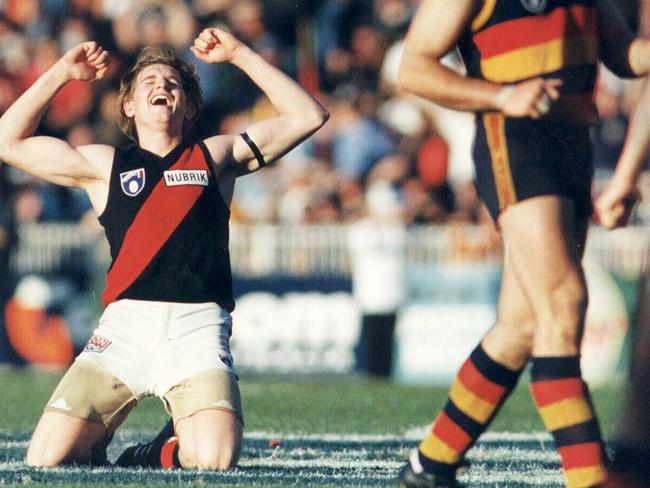
The final score was Essendon 17.9 (111) Adelaide 14.16 (100). The mood in the Crows' changerooms quickly turned sour.
GRAHAM CORNES: I was pretty measured until I talked about the previous Saturday night. You get what you deserve. If you don't prepare properly there's a price you pay. I mentioned the reports of players being at a nightclub until 3am or 4am. I must have been looking and talking at Sean Tasker. He said 'it wasn't me' and had a crack back at me.
SEAN TASKER: He got that all wrong. He ripped into us and he was really wrong. A few of us went to The Grand for dinner. McDermott and McGuinness had organised a room just to have a meal. (Team manager) John Condon gave Mark Ricciuto, Stuey Wigney and I a cabcharge because we all lived around the corner from each other. We caught a cab home. There was nothing untoward, we had dinner and went home. After that game Graham absolutely ripped the guts out of a few of us. It was a bit harsh because we didn't actually do what he said we did. Someone had obviously dobbed us in for something we didn't do. He pointed the finger at me and named me. I like Graham and I respect him but that moment was a real dark moment.
MARK RICCIUTO: Cornesy didn't want blokes drinking because he didn't drink. We had rules back then - six day breaks you definitely couldn't have a drink, seven days you could, but he didn't like it, and eight there's an opportunity to have a drink if you want … You don't get seven goals up from bad preparation. That's not why you lose games of football. If preparation was a problem we would have got blown out all day. That had nothing to do with it … If you're using that as an excuse, you're clutching at straws.
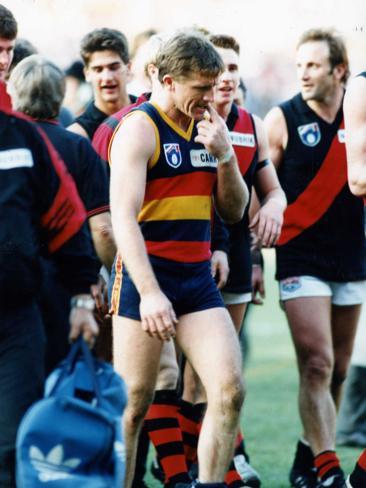
Back in Adelaide the Crows were still greeted as heroes.
GRAHAM CORNES: The Lord Mayor wanted to give us a welcome home parade. We finished third for crying out loud.
BILL SANDERS: I quickly knocked it on the head. Across the state there was a feeling of achievement but internally we knew we'd fallen short and it would have been embarrassing to accept a public parade.
The Bombers progressed to the Grand Final and led Carlton start to finish winning by 44 points. The Crows were left to wonder what might have been.
TONY MODRA: That was definitely one we let slip. For a lot of guys it was a new experience. Looking back now there's things you can say you would have changed but that's the way it rolls. A few of those guys got the opportunity again in 1997 and 1998 and made the most of it then.
ANDREW JARMAN: 1993 was our opportunity to win a flag and we blew it. That's the bottom line. Three years in the competition and we could have won a Grand Final. It's unheard of. None of us watched the Grand Final, it was too hard. Because we would have beaten Carlton - and they knew that. Carlton knew that.
SHAUN REHN: We played a lot of really good footy towards the end of that season and had a lot of really good players in the prime of their careers. Essendon went on to win the premiership and really run all over Carlton. Had we got past Essendon than we might have been able to get there as well. It was a massive missed opportunity. We just didn't take our chances. Maybe we didn't quite believe enough, I don't know.
ROD JAMESON: With the greatest respect to Carlton we felt whoever made it through to the Grand Final was going to win. It was certainly one that got away.
CRAIG BRADLEY: We would have been more than happy to play Adelaide in the Grand Final, I can assure you of that.
Adelaide, with a side that was on average less than half a year older than the baby Bombers, seemed poised for a sustained period of success. But the Crows failed to repeat the highs of '93, missing the finals from 1994-96.
ANDREW JARMAN: It was a big let-down mentally. The players had worked really hard in 1993 and our preseason changed slightly. There was a lot more pressure on because we'd got so close. It shows how quick you can fall if you don't do things right. I think a lot of our senior blokes were injured and didn't do a preseason. Our recruiting was average I felt in 1994. The expectation was enormous. 1994 was an average year for our footy club.
GRAHAM CORNES: There was a certain complacency. We won four out of the first six games and then had the State of Origin game. I never wanted to let down the SANFL so I think about 11 of our players played. We won it but after that we never got our momentum back.
SHAUN REHN: The wheels fell off. I don't think we realised how hard it was to make it into the finals with all those good Victorian sides - especially in a final six.
MARK RICCIUTO: I remember as a youngster thinking it doesn't matter, I'll do it again next year … It was just one that got away. Cornesy would have been a premiership coach in his third year in the AFL. The Crows would have won a premiership after three years in the AFL. That would have been unbelievable. McGuinness, McDermott, Jarman would have all been premiership players. In AFL football, the bounce of the ball, an umpiring decision, a bloody fart at half-time … can change history.
MARK BICKLEY: No one was ever game to say that (the fart) was the reason we lost in the first five or so years afterwards. Once the pain slowly drifted away after we won in 1997 and 1998 we were prepared to look back and make light of it. I'm not sure that was the reason, come on … I'd hate that to go down in history - someone farted at half-time and cost us a place in the Grand Final.
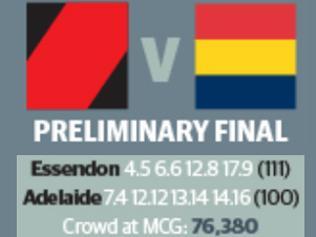
Chris McDermott, Nigel Smart, Wayne Weidemann, Greg Anderson, Darren Jarman and Michael Long did not respond to multiple interview requests.

